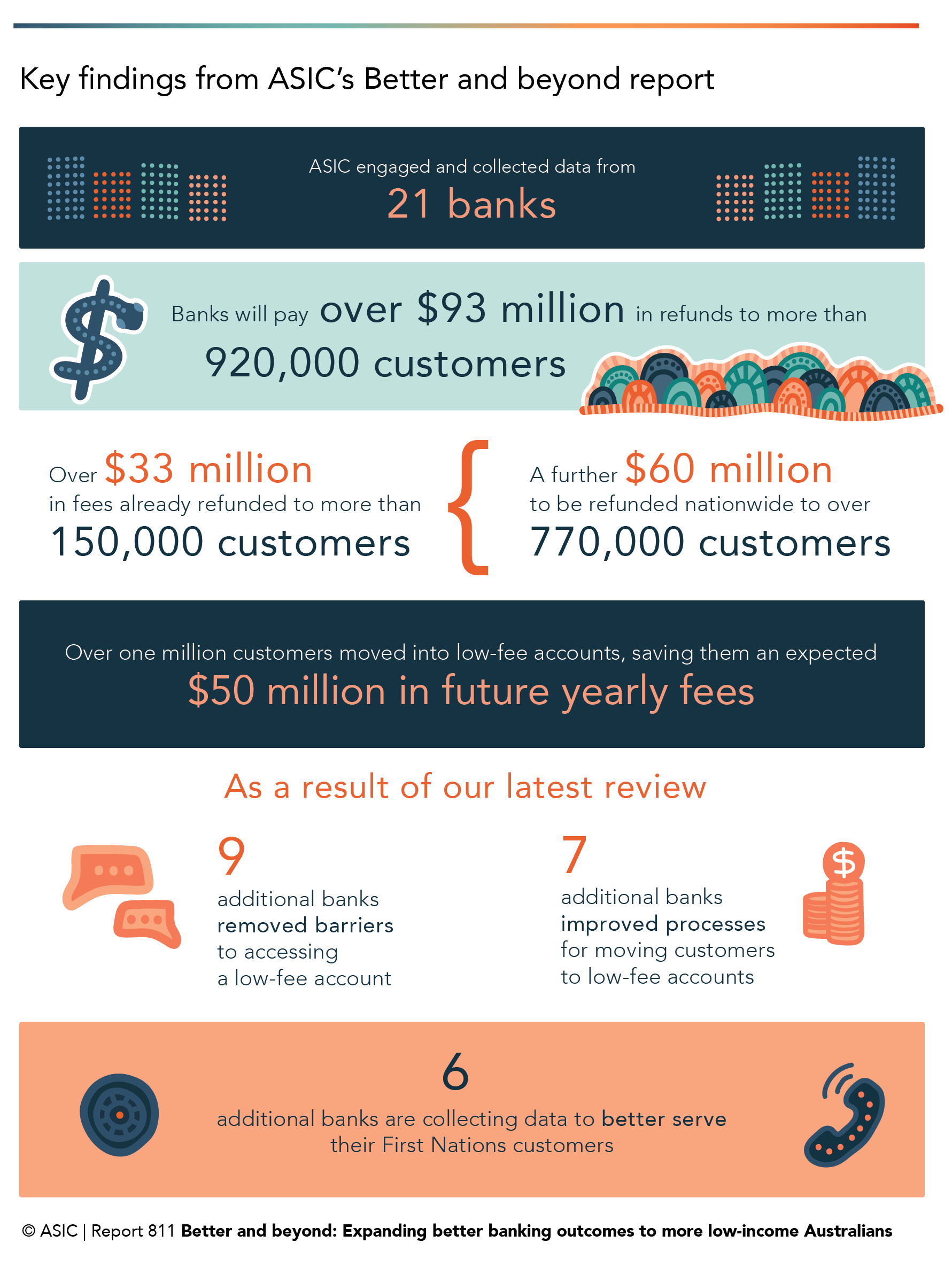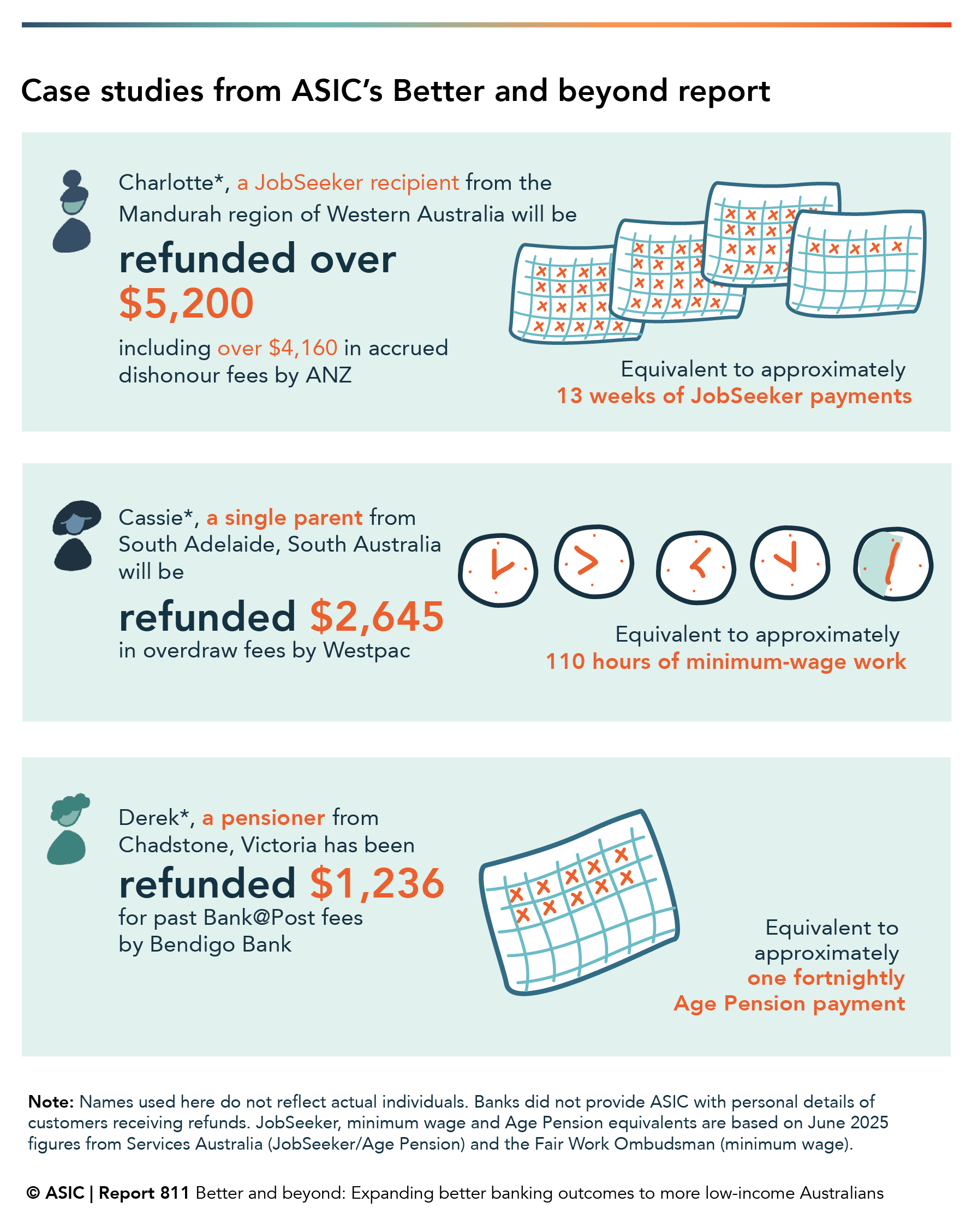

Banks charging high fees to those who can least afford it will refund more than $93 million to customers, following ASIC's latest bank-fee review.
Report 811 Better and beyond: Expanding better banking outcomes to more low-income Australians (REP 811), released today, details banks' responses to excessive fees charged on transaction accounts, affecting potentially millions of Australians.
ASIC Chair Joe Longo said, 'Despite the improvements banks have made during our surveillance, there is clearly work to be done.
'It should not take an ASIC review to force $93 million in refunds or make banks assess their processes to ensure the trust and expectations placed in them are justified.
'Banks need to truly hear the messages in this report-read it, review it, and ask themselves some difficult questions about what led to this situation.
'We expect banks to regularly assess product design and distribution to ensure customers have the most appropriate products and that they are given the support they need.'
ASIC's previous bank-fee report found banks had kept at least two million low-income Australians, who rely on Centrelink payments, in high fee accounts.
In its latest report, ASIC cast the net over more banks and found even larger numbers of low-income Australians paying too much.
ASIC Commissioner Alan Kirkland said, 'What started as an initiative focussed on addressing avoidable bank fees for low-income customers in regional and remote locations, particularly First Nations consumers, revealed a much wider problem affecting customers nationwide.
Infographic - Key findings from ASIC's Better and beyond report (text version)
- ASIC engaged and collected data from 21 banks
- Banks will pay over $93 million in refunds to more than 920,000 customers
- Over $33 million in fees already refunded to more than 150,000 customers
- A further $60 million to be refunded nationwide to over 770,000 customers
- Over one million customers moved into low-fee accounts, saving them an expected $50 million in future yearly fees
- As a result of our latest review 9 additional banks removed barriers to accessing a low-fee account, 7 additional banks improved processes for moving customers to low-fee accounts, 6 additional banks are collecting data to better serve their First Nations customers.
'Our latest work has seen the total amount of bank refunds increase to $93 million, and over one million customers moved into low-fee accounts, saving them an expected $50 million in future yearly fees.'
The $93 million in refunds consists of over $33 million in fees already refunded to more than 150,000 customers and a further $60 million to be refunded nationwide to over 770,000 customers.
Products and processes across the 21 banks reviewed varied, along with banks' responses.
Three of the four banks featured in ASIC's initial report have now committed to provide refunds of bank fees to a broader group of low-income customers who have been in high-fee accounts.
A further seven banks have improved processes while an additional nine banks have made it easier to access low fee accounts. This included removing the requirement to attend a bank branch or show a Commonwealth Seniors Health Care Card, Health Care Card or Pensioner Concession Card.
ASIC also encouraged banks to consider introducing or improving First Nations service channels, with six more banks now collecting data to identify First Nations customers to inform appropriate and sensitive service delivery.
'When you read in the report that refunds of $1,200, $2,600 and $5,200 were paid, it's important to understand what those amounts mean for people struggling to make ends meet,' Commissioner Kirkland said.
'A $1,200 refund was equivalent to one customer's fortnightly Age Pension. A $2,600 refund equalled around 110 hours of minimum-wage earnings for another customer, and a $5,200 refund matched 13 weeks of another customer's JobSeeker payment.'
'Our intervention has forced many banks to take action, but more needs to be done to ensure financially vulnerable consumers are not put in this position again.
'We encourage consumers to challenge their banks to ensure that they are in the best account for their needs. More importantly, we encourage banks to do more to proactively identify low-income customers and move them to low-fee accounts.'
ASIC will continue to receive updates from the banks in this review as part of its banking sector engagements and will take enforcement action where necessary.
Infographic - Case studies from ASIC's Better and beyond report (text version)
- Charlotte, a JobSeeker recipient from the Mandurah region of Western Australia will be refunded over $5,200 including over $4,160 in accrued dishonour fees by ANZ. Equivalent to approximately 13 weeks of JobSeeker payments
- Cassie, a single parent from South Adelaide, South Australia will be refunded $2,645 in overdraw fees by Westpac. Equivalent to approximately 110 hours of minimum-wage work








